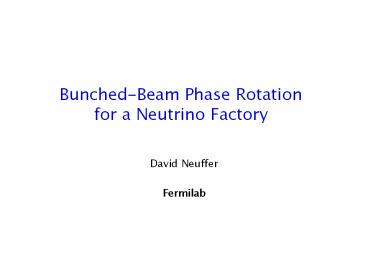Bunched-Beam Phase Rotation for a Neutrino Factory
Title:
Bunched-Beam Phase Rotation for a Neutrino Factory
Description:
Title: High-Frequency Adiabatic Buncher Last modified by: David Neuffer Document presentation format: On-screen Show Other titles: Lucida Sans Unicode Symbol ... – PowerPoint PPT presentation
Number of Views:4
Avg rating:3.0/5.0
Title: Bunched-Beam Phase Rotation for a Neutrino Factory
1
Bunched-Beam Phase Rotationfor a Neutrino
Factory
- David Neuffer
- Fermilab
2
Outline
- Introduction
- Study 2 scenario
- Induction linac phase rotation 200 MHz buncher
- High-frequency Buncher and ???? Rotation
- Initial concept
- A. V. G. Simucool optimization
- Elvira, Keuss Geant4 simulations
- Cost guesstimates
- Match into cooling channel
- Initial attempts
- Future plans
3
Neutrino Factory Baseline Design
- Feasible, but expensive
- Find ways to reduce costs
4
Induction Linac Technology
- Study II scenario uses
- 250m long induction linac
- to capture muons.
- Cost is very high
- Technology is difficult
5
Study 2 Capture Cooling (ICOOL)
x 20 to 100m y 0 to 400 MeV
6
Adiabatic buncher (induction linac ? 200MHz rf)
- Drift (100m)
- Allows ??? beam to decay
- beam develops ???? correlation
- Buncher (60m (?)) (300?200MHz)
- Bunching rf with E0 125?50 MeV set at 15 ?
separation - Vrf increases gradually from 0 to 4.8 MV/m
- ???? Rotation (200MHz)
- Fixed frequency Vrf set at a maximum value
(10MV/m) - Beam rotates by 1/4 synchrotron oscillations to
reduce ?? - Cooler
- fixed frequency transverse cooling system (100m
long)
Replaces Induction Linacs with medium-frequency
rf (200MHz) !
7
Longitudinal Motion Through System (1-D
simulations)
Drift
Bunch
???E rotate
Cool
System would capture both signs (?, ?-) !!
8
Optimizations (AvG, SIMUCOOL)
- Large statistics tracking code (SIMUCOOL, A. Van
Ginneken) can be used to reoptimize Buncher
???E Rotation - 1 - Optimize baseline case obtains 0.3 ?/p
- 2 - Change fixed-frequency to vernier rotation
- (N-1/2 wavelengths from first to last ref.
bunch) obtains 0.35 ?/p - 3 Reoptimize all parameters
- Drift to 76m,
- Buncher parameters changed
- Reference energies 64 MeV 186MeV, N20 384?233
MHz - Linear ramp in voltage 0 to 6.5MV/m, 60m long
- Rotator changed
- vernier frequency (20 ?) wavelengths between
reference bunches (234?220 MHz), 10MV/m, Best
case has ? ? 0.16 - 30m long
- Obtains 0.4 ?/p
9
Simucool- first optimized buncher and fixed
frequency ???E rotation
- Obtains 0.28 ?/p at end of buncher
10
Bunching and ???? Rotation
Beam after drift plus adiabatic buncher Beam
is formed into string of 200MHz bunches
Beam after 200MHz rf rotation Beam is formed
into string of equal-energy bunches matched to
cooling rf acceptance
System would capture both signs (?, ?-) !!
11
GEANT4 simulations (D. Elvira)
- Fully realistic transverse and longitudinal
fields - Magnetic fields formed by current coils
- Rf fields from pillbox cavities (within
solenoidal coils) - Studied varying number of different rf cavities
in Buncher - (60 (1/m) to 20 to 10) 20 was better, 10
only a bit worse - Simulations of ?-dE rotation
- Will (?) extend simulations optimization
through cooling channel
12
10-frequency Buncher
Only 10 frequencies and voltages. (10
equidistant linacs made of 6 cells)
62.2 of the particles survive at the end of the
buncher.
13
GEANT4 Phase Rotation (D. Elvira, N. Keuss)
Phase rotation successful Agrees with simplified
models/simulations NOT optimized Need to
continue with simulation into cooling channel
14
Hardware/Cost For Buncher/Rotator
- Rf requirements
- Buncher 300?210 MHz 0.1?4.8MV/m (60m)
- (10 frequencies 10MHz intervals)
- ???? Rotator 210?200 MHz 10MV/m (10m)
- Transverse focussing
- B1.25T solenoidal focusingR0.30m transport
- System Replaces Study 2
- (Decay(20m, 5M) Induction Linacs(350m, 320M)
Buncher(50m,70M)) - with
- Drift (100m) Buncher (60m)Rf Rotator (10m)
- (Rf 30M (Moretti) magnets 40M(M. Green)
conv. fac.,misc. 20M) - (400M ? ?? 100M )
- ? needs more RD
15
Next step match into cooling channel !
- Need to design a new cooling channel, matched to
bunched/rotated beam - Do not (yet) have redesigned/matched cooling
channel - Use (for initial tries)
- ICOOL beam from end of AVG simulations
- Beam has transverse emittance ?? ? 0.02
- Better betatron match with B 3T
- Study 2 cooling channel
- Cools from ?? ? 0.012m to ?? ? 0.0022m
- Direct transfer of beam (no matching section)
- Varied central energy central rf phase
16
Caveats Not properly matched
- This is not the way to design a neutrino factory
- Not properly matched in betatron and synchrotron
phase space - Cooling channel acceptance is much smaller than
initial beam (no precooler) - Correlation factors wrong no field flip
before cooler - Cooling channel collimates as much as it cools
17
Results (ICOOL)
- In first 10m, 40 of ?s from buncher are lost,
- ?? ? 0.020m? ?? ? 0.012m
- Remaining ?s continue down channel and are
cooled and scraped, ?? ? 0.0022m, similar to
Study 2 simulation. - Best energy, phase gives 0.22 ?s /24 GeV p
- Study 2 baseline ICOOL results is 0.23 ?s/p
18
ICOOL simulation Buncher, ????, Cool
19
Summary
- High-frequency Buncher and ???E Rotator
simpler and cheaper than induction linac system - Performance as good (or almost ) as study 2,
- But
- System will capture both signs (?, ?-) !
- (Twice as good ??)
- To do
- Complete simulations with matched cooling
channel! - Optimizations, Scenario reoptimization
- Other Variations
- Shorter bunch trains, quad focussing,
lower rf frequency, collider parameters































